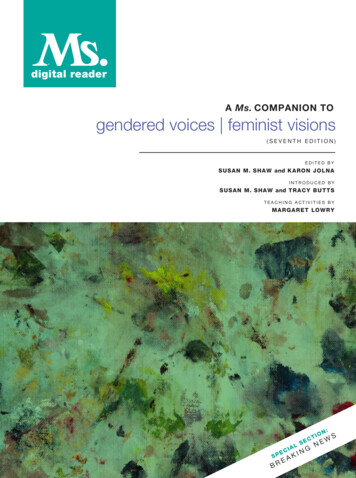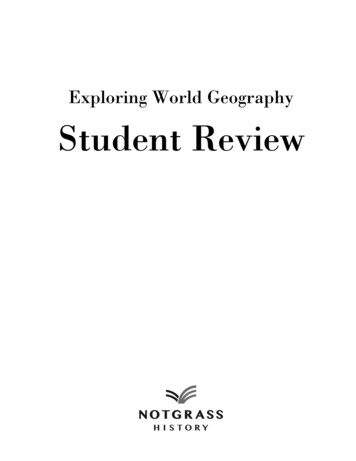
Transcription
FFJ-MICHELIN FOUNDATION WORKSHOPCycling through gendered lives: exploring the linkbetween structural gender inequalities, gender normsand mobility practices in Japan and beyond20 - 21 January 202210.00 - 12.45 (France) 18.00 - 20.45 (Japan)Online In EnglishRegistration: https://forms.gle/XVuKka1SN8dHKq4s5Contact: events ffj@ehess.frWomen remain strongly underrepresented among cyclists in Western cities (Pucher and Buehler, 2012). Past studiesexploring barriers to women cycling have reached two conclusions. First, women would not cycle as much as menbecause they would be more risk-averse ; second, unequally shared domestic responsibilities would make theirmobilities too complex to cycle (Ravensbergen et al, 2019). Women would thus be more likely to cycle where securedinfrastructure is provided, and where domestic tasks are equally shared between men and women (Prati et al.,2019). However, these widely accepted results, based on concurring Western studies, do not hold in the context ofTokyo. In Tokyo, women represent the majority (57%) of cyclists (Goel et al., 2021) and cycling is overwhelminglyused for household-serving trips (TMATPC, 2018). Yet, Japan is marked by strong gender inequalities: Japanesewomen spend on average 23 hours per week on care and household chores, while men only spend 5 hours on thesetasks (Cabinet Cabinet Office; Gender Equality Bureau 2016). Japanese women also face the largest wage gap inthe world, and lack of welfare state support still encourages a lot of them to quit their job when they have a child(Shirahase, 2014). This case points to the complex links between women’s mobilities and their position in society.This workshop will explore the link between structural gender inequalities, cultural gender norms, and women’sbicycling practices. Research works from around the world will be confronted to the “critical case” (Flyvbjerg, Bent2006) of Tokyo to identify ways forward for research on gender and cycling. To accommodate researchers fromseveral different countries, and given the ongoing travel uncertainties associated with the COVID-19 pandemic, thisworkshop will be held online. Speakers will present for 30 minutes ; each presentation will be followed by 15 minutesof discussion.
Programme20th January 202210.00-12.45 (France) 18.00-20.45 (Japan)9.00-11.45 (United Kingdom)10.00 Opening RemarksSébastien Lechevalier (FFJ-EHESS), Pierre-Édouard Sorel (Michelin), Marion Lagadic(2021 FFJ/Michelin Foundation fellow, University of Oxford)Session 1Moderator: Marion Lagadic (2021 FFJ/Michelin Foundation fellow, University of Oxford)10.15 Working ‘through’ urban transformationsDr. Nihan Akyelken (University of Oxford)11.00 Local care loops and classed time disciplinesDr. Lena Näre (University of Helsinki)11.45 Materialities of gendered cycling experiences in France and inAustraliaMargot Abord de Chatillon (University of Lyon)12.30 Concluding RemarksMarion Lagadic (2021 FFJ/Michelin Foundation fellow, University of Oxford)
21th January 202210.00-12.45 (France) 18.00-20.45 (Japan)9.00-11.45 (United Kingdom)10.00 Opening RemarksMarion Lagadic (2021 FFJ/Michelin Foundation fellow, University of Oxford)Session 2Moderator: Marion Lagadic (2021 FFJ/Michelin Foundation fellow, University of Oxford)10.15 Gendered Realms, Gendered Activities, and Gendered Norms inJapanDr. Chigusa Yamaura (University of Oxford)11.00 Planning Policies and Diverse Bicycle Needs in Japan: the visionand gapDr. Kazuki Nakamura (Meijo University)11.45 Tokyo’s new stance towards cycling: a gender analysisMarion Lagadic (2021 FFJ/Michelin Foundation fellow, University of Oxford)12.30 Concluding RemarksSébastien Lechevalier (FFJ-EHESS)
Introductions and chair(alphabetical order)Marion Lagadic (DPhil candidate, University of Oxford/2021FFJ/Michelin Foundation fellow)Marion Lagadic is a doctoral student on the DPhil in Sustainable Urban Developmentat the University of Oxford, under the supervision of Dr. Nihan Akyelken. Her researchexplores the relations between cycling practices and gender in Japanese cities. InWestern Europe and North America, sustainable mobility is far from gender-inclusive:the vast majority of urban cyclists are men. In Japan, the contrary is true: the vastmajority of urban cyclists are women. Marion Lagadic’s research tackles the genderingof cycling practices in Tokyo, and explores Jwomen’s cycling practices in the contextof their position in the Japanese society.Title: Tokyo’s new stance towards cycling: a gender analysisIn June 2018, the Japan Ministry of Land, Infrastructure, Transport and Tourism adopted the Bicycle UtilisationPromotion Plan (MLIT 2018), a new national framework to promote cycling and guide the development of localbicycle promotion plans. It was the first overarching bicycle promotion strategy adopted at the national level,encompassing all dimensions of the topic: infrastructure development, education, and safety. In 2019, the TokyoMetropolitan Government adopted its own Bicycle Utilisation Promotion. These strategies were adopted in acountry and city where women represent the vast majority of cyclist; yet, the gender dimension of this practiceis not addressed in these policy documents. This presentation will discuss cycling policy in Tokyo from a genderperspective: how do Japanese policymakers imagine current cyclists, as well as the future of cycling? Wheredo cycling women fit into this strategy? What might be the gendered impact of this cycling promotion strategy?Sébastien Lechevalier (Professor at EHESS/President ofthe Fondation France-Japon de l'EHESS)Sébastien Lechevalier is an Economist and a Professor at EHESS (School of AdvancedStudies in the Social Sciences, Paris), specialised in Japanese economy and AsianCapitalisms. He is also founder and president of the Fondation France‑Japon del’EHESS (FFJ). He has been a Visiting Professor at the University of Tokyo, KyotoUniversity, Hitotsubashi University, Waseda University and Doshisha University.Pierre-Édouard Sorel (Director of Movin'On Development,Michelin)Pierre-Édouard Sorel started his career with the Renault car company in Istanbul,Turkey, before joining in various product marketing positions in France. He has beenworking for Michelin for the last 15 years, in the areas of sales, market intelligence,and marketing as a segment manager and entrepreneur to bring new innovations tothe market. Since June 2020, he has joined the Movin’On Ecosystem within Michelinto promote sustainable mobility and ecosystem innovations. He received his master’sdegree in management with a specialization in marketing from the École des hautesétudes commerciales de Paris (HEC Paris) in 1998.
Speakers(alphabetical order)Nihan Akyelken (Associate Professor in SustainableUrban Development, University of Oxford)Nihan Akyelken joined the University of Oxford as a Research Fellow at the TransportStudies Unit in the School of Geography and the Environment in October 2008. InFebruary 2015, she started working as a Departmental Lecturer on the SustainableUrban Development programme and in January 2017 was appointed as AssociateProfessor in Sustainable Urban Development. Previously, she worked at the LondonSchool of Economics and Political Science (LSE) Public Policy Group. She obtainedher doctorate in Economic Geography from the University of Oxford. Nihan Akyelkenis an economic and social geographer, specialising in mobility of people and goods,inequalities and access, infrastructure, labour and work. Her research is based on bothqualitative and quantitative methodologies and to date has addressed the following concerns: Infrastructure,work and labour; Work, gender and mobility; Governance and social implications of low-carbon mobilityinnovations; Mobility of goods, globalisation and sustainability.Title: Working ‘through’ urban transformationsThe process of urban transformation in terms of built environment, human experiences and metabolisms andflows (of financial, social and cultural capital) alter the nature of work with implications for everyday life. Whetherlived or perceived, transformed patterns of everyday life in urban space reconstitute labour agency either byconstricting or strengthening at different points in their lives. In this paper, Nihan Akyelken looks at the genderedmobilities within the low-paid service sector in Istanbul by bringing the role of urban interventions. The empiricalinvestigation goes beyond the journey-to-work approach and shows the non-infrastructural aspects of urbantransformations demonstrating mobility as a reworking practice by politicizing the mobility space (everydaycommuting) and using it to organize life (planning for residential mobility in line with life aspirations).Margot Abord de Chatillon (Doctoral candidate,University of Lyon)Margot Abord de Chatillon is a doctoral candidate at the LAET-ENTPE (Universityof Lyon). After researching urban public spaces at the University of Amsterdam, shemoved on to exploring urban cycling at the LAET-ENTPE. Through a comparativestudy of bicycle repair practices in Melbourne and Lyon, she questions the relationshipbetween cyclists and their vehicles. Her research brings some understanding torepair and maintenance practices, to the bicycle repair urban ecosystem, andassociated issues of agency, autonomy and socio-economic inequalities withinmobility. Furthermore, she takes a unique approach to cycling by shedding light onthe consumption practices associated with this form of mobility.Title: Materialities of gendered cycling experiences in France and inAustraliaOne way to apprehend the gender inequalities occurring within mobility, and more specifically within cycling,is by focusing on material culture. Indeed, gender norms are strongly embedded in our everyday interactionswith material objects. This presentation dwells on fieldwork conducted among cyclists, community workshopvolunteers and cycle mechanics in the cities of Lyon (France) and Melbourne (Australia) in order to investigategender norms as they structure both cycling and bicycle repair and maintenance practices. Margot Abord deChatillon shows that women are inhibited in their material interactions with bicycles by a patriarchal environmentin many ways. She also discusses some forms taken by feminist attempts to reappropriate bicycles, both in thecourse of cycling and of repair and maintenance.
Kazuki Nakamura (Associate Professor in Urban Studies,Meijo University)Kazuki Nakamura specialises in transport planning and urban design, and workswithin the Department of Civil Engineering at Meijo University. His work explores howsustainable urban systems should be designed to respond to future medium and longterm social changes, including population decline and aging. His work specificallytackles the role of active modes such as walking and cycling, with a specific attentionto inclusiveness. He conducts cross-disciplinary research influenced by both thefields of engineering and urban planning, and uses a wide range of methods, fromeconometrics to environmental psychology.Title: Planning Policies and Diverse Bicycle Needs in Japan: the visionand gapBicycle has been a popular travel mode in Japan, particularly for women and children, but it is only recently thatplanning policies strategically promote bicycle use in the context of sustainable transport, active travel, resilienttransport, and sports tourism. This presentation consists of the overviews of planning policy and bicycle needsin Japan. The bicycle policy part shows the policy transition from the control of excessive private bicycle usethrough controlling bicycle parking to the promotion of strategic bicycle use through developing bicycle sharingschemes and cycle lane networks. However, these policies are more about infrastructure and lacks attention tousability for diverse users, including gender. The bicycle use part accounts for the needs of bicycle use in Japanin the cultural background, using the national travel data of bicycle use by gender, age, purpose, city, and year.It also takes account of the COVID impacts on bicycle use in Japan. In the end, inclusive planning policies fordiverse bicycle needs will be discussed.Lena Näre (Associate Professor of Sociology, Universityof Helsinki)Lena Näre is an Associate Professor (Tenure Track) of Sociology at the University ofHelsinki, Department of Social Research. Her research interests include sociology ofwork, care, ageing, globalisation, sociology of migration, gender studies, ethnic andracial studies, social theories and ethnographic methods. She is currently leading theresearch project ‘Struggles over Home and Citizenship’ funded by Kone Foundation(2018-2021). She is the editor-in-chief of the Nordic Journal of Migration Researchand vice-head of discipline of Sociology at the University of Helsinki, Finland.Title: Local care loops and classed time disciplinesIn this paper, Lena Näre combines an everyday and temporal perspective to social policies to analyse how Finnishcash-for-care policies produce certain spatiotemporal arrangements around the organization of care, or what wehave termed local care loops (Isaksen & Näre 2019). Temporalities, or the organizing of time, is a fundamentalfeature of contemporary capitalism and the daily practices of organizing time are part of the political economyof contemporary societies (Harvey, 2010). This everyday spatiotemporal perspective allows us to understandwhy in a society with relatively expansive public childcare services, middle-class families are turning to privatecaregivers (nannies, au pairs). Analysing interviews with Finnish employers of privately employed childcarersfrom this perspective demonstrates varying classed time disciplines in which care is organised in a way thatmaximizes time available for wage labour on the one hand and the organization of ‘quality time with children’ onthe other hand (Näre & Wide 2019).ReferencesHarvey, D. (2010) A Companion to Marx’s Capital. New York: Verso.Isaksen, LW. & Näre, L. (2019) ‘Local loops and micro-mobilities of care: rethinking care in egalitarian contexts’,Journal of European Social Policy, 29(5): 593–599.Näre, L. & Wide, E. (2019) ‘Local loops of care in the metropolitan region of Helsinki – a time economy perspective’,Journal of European Social Policy, 29(5): 600–613.
Chigusa Yamaura (Junior Research Fellow andDepartmental Lecturer in Japanese Studies, Universityof Oxford)Chigusa Yamaura is a sociocultural anthropologist, specialising in contemporaryJapanese and Chinese society. She received her PhD from Rutgers University in 2013,and since 2015 she has been a Junior Research Fellow at Wolfson College, Universityof Oxford. Her research investigates the ways in which intimate life intersects withlarger social and political ideologies (such as nationalism and gendered life courseexpectations) and processes (such as transnational flows and demographic change).Her work addresses a broad array of topics, including gender, marriage, cross-bordermarriage, family, life course expectations, motherhood, reproduction, childcare, andfertility as well as migration, colonial memory, and transnationalism in East Asia.Title: Gendered Realms, Gendered Activities, and Gendered Norms inJapanIn this presentation, Chigusa Yamaura examines how gender norms have materialised within social space andsocial activities in Japan. More specifically, she askes how space has been gendered not just discursively butalso physically, and how social conceptions of gendered realms have changed over time. In post-war Japan,especially during the economic boom years, the norm of the “post-war Japanese family” (Ochiai 1997) wasconstituted within strict gendered divisions of labour in Japanese society more widely. This paper however showsthat now, against the background of perceptions of an ageing population and low-fertility society, a new normativemodel of what Chigusa Yamaura calls the “productive and reproductive family” has emerged, especially sincethe 1990s. Within this new family model, Japanese women are expected to be just as productive as men, butat the same time retain their reproductive roles as well. she argues that the productive and reproductive familyhas blurred the physical separation of gendered realms at home and in society, but it nonetheless paradoxicallyreinforces the notion that the gendered differences are crucial for promoting the prosperity of Japanese societymore broadly.Workshop abstract referencesCabinet Office. 2016. 社会生活基本調査. Gender Equity Bureau. Government of Japan.FLYVBJERG, B. 2006. Five Misunderstandings about Case-Study Research.GOEL, R., GOODMAN, A., ALDRED, R., NAKAMURA, R., TATAH, L., GARCIA, L. M. T., ZAPATA-DIOMEDI,B., DE SA, T. H., TIWARI, G., DE NAZELLE, A., TAINIO, M., BUEHLER, R., GÖTSCHI, T. & WOODCOCK, J.2021. Cycling behaviour in 17 countries across 6 continents: levels of cycling, who cycles, for what purpose,and how far? Transport Reviews, 1-24.PRATI, G., FRABONI, F., DE ANGELIS, M., PIETRANTONI, L., JOHNSON, D. & SHIRES, J. 2019. Genderdifferences in cycling patterns and attitudes towards cycling in a sample of European regular cyclists. JournalOf Transport Geography, 78, pp1-7.PUCHER, J. & BUEHLER, R. 2012. City cycling, Cambridge, Mass., MIT Press.RAVENSBERGEN, L., BULIUNG, R. & LALIBERTÉ, N. 2019. Toward feminist geographies of cycling.Geography Compass, 13, n/a-n/a.Tokyo Metropolitan Area Transport Planning Council. 2018. 18th Person Trip Survey. Tokyo: Tokyo MetropolitanArea Transport Planning Council.
constricting or strengthening at different points in their lives. In this paper, Nihan Akyelken looks at the gendered mobilities within the low-paid service sector in Istanbul by bringing the role of urban interventions. The empirical investigation goes beyond the journey-to-work ap










